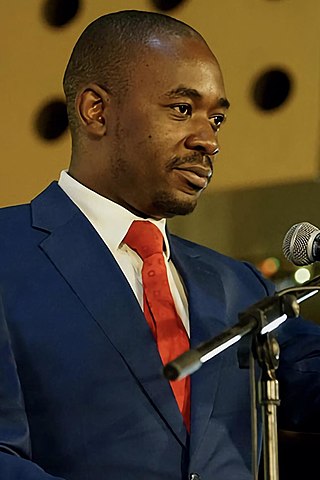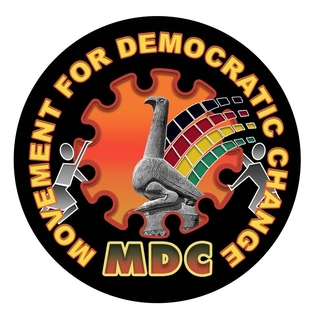Related Research Articles

Roy Leslie Bennett was a Zimbabwean politician and member of the British South Africa Police. He was also a member of the House of Assembly of Zimbabwe for the seat of Chimanimani, where he was affectionately known as Pachedu. He was the Treasurer of the Movement for Democratic Change party led by Morgan Tsvangirai and a member of the Senate of Zimbabwe. He was set to become the Deputy Minister of Agriculture of Zimbabwe until President Robert Mugabe refused to swear him in.

Arthur G.O. Mutambara is a multifaceted leader, academic, and technology expert currently serving as the director and full professor of the Institute for the Future of Knowledge (IFK) at the University of Johannesburg (UJ) in South Africa. Renowned for his expertise in robotics, academia, Pan-Africanism, and technology strategy, he is a pivotal figure in shaping the future of knowledge and technological advancement. At IFK, Mutambara leads the Decentralized Artificial Intelligence and Control Systems (DAICS) Research Group, driving groundbreaking research initiatives. He also spearheads the African Agency in Public Health (AAPH) initiative within the Future of Health (FoH) Research Group, demonstrating his commitment to leveraging technology for societal well-being. In addition to his academic responsibilities, Professor Mutambara is deeply involved in teaching Control Systems at both UJ's Mechanical Engineering and Electrical and Electronic Engineering Departments, imparting knowledge and fostering innovation among students.

Tendai Laxton Biti is a Zimbabwean politician who served as Finance Minister of Zimbabwe from 2009 to 2013. He is the second Vice President of Citizens Coalition for Change. He was the Secretary-General of the Movement for Democratic Change and the subsequent Movement for Democratic Change – Tsvangirai (MDC-T) political parties and a Member of Parliament for Harare East until he was expelled from the party and recalled from parliament in mid-2014,before winning the seat again in 2018.

Nelson Chamisa is a Zimbabwean politician and the former President of the Citizens Coalition For Change. He served as Member of the House of Assembly of Zimbabwe for Kuwadzana East, Harare. Chamisa was the MDC Alliance's candidate for president in the 2018 general election, having previously been the leader of the party's youth assembly. He was the Presidential candidate for the Citizens Coalition for Change in the 2023 Zimbabwean Presidential election. He has served as the former chairperson of national youth for the same party as well as the Secretary for Information and Publicity for the opposition party Movement for Democratic Change (MDC). In 2003, at the age of 25, Chamisa became the youngest Member of Parliament. Chamisa was also the youngest cabinet minister in Government of National Unity of Zimbabwe in 2009.
Zimbabwe began experiencing a period of considerable political and economic upheaval in 1999. Opposition to President Mugabe and the ZANU-PF government grew considerably after the mid-1990s in part due to worsening economic and human rights conditions. The Movement for Democratic Change (MDC) was established in September 1999 as an opposition party founded by trade unionist Morgan Tsvangirai.

Kembo Dugish Campbell Muleya Mohadi is a Zimbabwean politician and Vice-President of Zimbabwe since 8 September 2023. He previously served in the same role from 28 December 2017 to 1 March 2021, when he resigned. He briefly served as the Minister of Defence, Security and War Veterans in 2017. Previously he was Minister of State for National Security in the President's Office from 2015 to 2017 and Minister of Home Affairs from 2002 to 2015.
Campaigning for the first round of the presidential election held in Zimbabwe on 29 March 2008 took place from February to March. There were three major candidates: President Robert Mugabe of the ruling Zimbabwe African National Union - Patriotic Front (ZANU-PF), Morgan Tsvangirai of the opposition Movement for Democratic Change, and the independent candidate Simba Makoni.
This article gives details about the vote counting system for the 2008 Zimbabwe presidential election
Zambian President Levy Mwanawasa called an emergency meeting of SADC leaders for 12 April during the 2008 Zimbabwe presidential election to discuss the post-election impasse. According to Mwanawasa, Zimbabwe's "deepening problems" meant that the issue needed to be "dealt with at presidential level". Jacob Zuma, meanwhile, said that he thought results should have already been announced, and he described the failure to release them as "unprecedented".
The second round of voting in the Zimbabwean presidential election of 2008 was held between Robert Mugabe and Morgan Tsvangirai after the first round failed to produce a 50% majority for either candidate. The election process was marred by violence against and intimidation of voters and party workers, which eventually led to the withdrawal of Tsvangirai from the poll. This left Mugabe as the winner of, effectively, a one-candidate election.

The 2008–2009 Zimbabwean political negotiations between the opposition Movement for Democratic Change, its small splinter group, the Movement for Democratic Change – Mutambara, and the ruling Zimbabwe African National Union – Patriotic Front were intended to negotiate an end to the partisan violence and human rights violations in Zimbabwe and create a framework for a power-sharing executive government between the two parties. These negotiations followed the 2008 presidential election, in which Mugabe was controversially re-elected, as well as the 2008 parliamentary election, in which the MDC won a majority in the House of Assembly.

The Movement for Democratic Change (MDC) was a Zimbabwean political party organised under the leadership of Morgan Tsvangirai. The MDC was formed in 1999 as an opposition party to President Robert Mugabe's Zimbabwe African National Union – Patriotic Front (Zanu-PF). The MDC was made up of many civic groups who campaigned for the "No" vote in the 2000 constitutional referendum, which would limit a president's service to two terms, before the introduction of a prime minister, as well as giving legal immunities to the state.

The Movement for Democratic Change – Tsvangirai (MDC–T) is a centre-left political party and was the main opposition party in the House of Assembly of Zimbabwe ahead of the 2018 elections. After the split of the original Movement for Democratic Change in 2005, the MDC–T remained the major opposition faction, while a smaller faction, the Movement for Democratic Change – Ncube, or MDC–N, was led by Welshman Ncube.

Morgan Richard Tsvangirai was a Zimbabwean politician who was Prime Minister of Zimbabwe from 2009 to 2013. He was president of the Movement for Democratic Change, and later the Movement for Democratic Change – Tsvangirai (MDC–T), and a key figure in the opposition to former president Robert Mugabe.

General elections were held in Zimbabwe on 31 July 2013. Incumbent President Robert Mugabe was re-elected, whilst his ZANU–PF party won a two-thirds majority in the National Assembly.

General elections were held in Zimbabwe on 29 March 2008 to elect the President and Parliament. Because of Zimbabwe's dire economic situation, the elections were expected to provide incumbent President Robert Mugabe with his toughest electoral challenge to date. Mugabe's opponents were critical of the handling of the electoral process, and the government was accused of planning to rig the election. Human Rights Watch said that the election was likely to be "deeply flawed." The elections were characterized by violence.

General elections were held in Zimbabwe on 30 July 2018 to elect the President and members of both houses of Parliament. Held eight months after the 2017 coup d'état, the election was the first since independence in which former President Robert Mugabe was not a candidate.
Zimbabwe First Party (ZimFirst) is a political party in Zimbabwe which was founded on 10 April 2015. The party was founded by its current President Maxwell Zeb Shumba, who once served as the Chief Political Strategist for the other opposition political party's leader Morgan Tsvangirai. According to the official statement posted on the party's website, ZimFirst 's main objective is to form the next government through the electoral process, National elections in Zimbabwe are slated for 2018 and the party states that it will contest the presidential and parliamentary election. According to the party's manifesto primary focus of its government would be to re build the economy from an alleged US$4 billion to a "near US$1,5 trillion robust economy". At the time, Morgan Tsvangirai's spokesperson said he was unmoved by Shumba’s departure to form a new party. The Party slogan is Nyika Vanhu, Vanhu Ndiyo Nyika (Shona language version), Abantu Ilizwe, Yilizwe Ngabantu (Ndebele language version). Its ideology is enshrined in the three key principles of Honesty, Accountability, and Unity.

The Liberal Democrats of Zimbabwe was formed in 2015 from South Africa. It is a political party registered in terms of ZEC requirements in Zimbabwe. The party did not participate in the 2018 general election. In 2016 it petitioned the Zimbabwean Embassy in Pretoria over the spending of US$800,000 on Robert Mugabe's birthday when many Zimbabweans were starving.
The Movement for Democratic Change Alliance is an electoral coalition of seven political parties formed to contest Zimbabwe's 2018 general election. After the 2018 election, a dispute arose over the use of the name MDC Alliance leading the MDC Alliance leader Nelson Chamisa to found the Citizens Coalition for Change.
References
- ↑ "ZimFirst Party | The Unifying Force | Getting Zimbabwe Working AgainZimFirst Party". zimfirst.org. Archived from the original on 26 June 2015.
- ↑ Shearouse, William C.; Shumba, Maxwell Z.; Mack, James (8 April 2014). "A Solvent-Free, One-Step, One-Pot Gewald Reaction for Alkyl-aryl Ketones via Mechanochemistry". Applied Sciences. 4 (2): 171–179. doi: 10.3390/app4020171 .
- ↑ Mack, James; Shumba, Maxwell (2007). "Rate enhancement of the Morita–Baylis–Hillman reaction through mechanochemistry". Green Chem. 9 (4): 328–330. doi:10.1039/B612983H.
- ↑ "Open letter to Professor Lovemore Madhuku". 20 June 2013.
- ↑ "A new opposition in Zimbabwe | Workers' Liberty".
- ↑ "The Zimbabwe Situation". www.zimbabwesituation.com. Retrieved 18 February 2016.
- ↑ "Zimbabwe's Constitution-Making Committee Looking for US$3 Million Supplementary Budget".
- ↑ "Tsvangirai appoints chief political strategist - Zimbabwe Situation". Zimbabwe Situation. 25 April 2014. Retrieved 18 February 2016.
- ↑ "Tsvangirai adviser forms own party". NewsDay Zimbabwe. 28 September 2015. Retrieved 18 February 2016.
- ↑ "zim NET radio". zim NET radio. 10 July 2015. Retrieved 18 February 2016.
- ↑ "The last days: Hunger stalks Zimbabwe as Mugabe clings on".
- ↑ "Zimbabwe has to start thinking about what the country should be like after its elderly president-for-life leaves power". Business Insider. Retrieved 18 February 2016.
- ↑ "Zimbabwe's crippling 48-hour long blackouts have forced the economy to conduct 'business by candlelight'". Business Insider. Retrieved 18 February 2016.
- ↑ "Zimbabwe is 'North Korea lite'". Business Insider. Retrieved 18 February 2016.
- ↑ "Zimbabwe is 'North Korea lite'". Business Insider .
- ↑ "The Elephant in the Room". Human Rights Watch. 5 June 2013. Retrieved 18 February 2016.